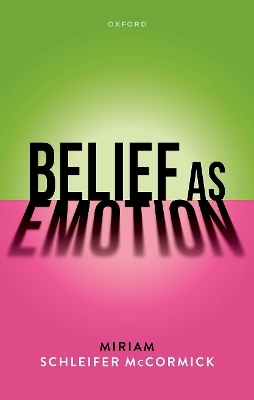
Belief as Emotion
Oxford University Press (Verlag)
978-0-19-887582-6 (ISBN)
Given their complicated relationship to evidence and action, many theorists claim that such attitudes should not be categorized as beliefs, but as a different mental state. Belief as Emotion does not force us to exclude states as real beliefs that we pre-reflectively think of as beliefs, and that does not require us to “outsource” the work belief seems to do to other mental states. The view also illuminates the phenomena of self-deception, implicit bias, and deep disagreement. Ideal emotional maintenance is complex; thinking of beliefs as emotions acknowledges and embraces this complexity of our doxastic lives.
Miriam Schleifer McCormick is a Professor of Philosophy at the University of Richmond. Her central research interests focus on the nature and norms of belief. This interest has also led her to think and write about reasons, agency, hope, imagination, and emotions. She has published articles on issues at the cross section of epistemology and ethics, and is the author of Believing Against the Evidence: Agency and the Ethics of Belief (Routledge, 2015) She is a researcher in the normativity and affectivity axis of GRIN and collaborating member of the ethical foundation axis at CRÉ, research centres based at the Université de Montréal.
Preface
1: Introduction
1.1 Is the view of belief as emotion problematically revisionary?
1.2 The standard view of belief and the rise of non-doxasticism
1.3 Is this a "?
1.4 Chapter summaries
2: Belief as a Blended State
2.1 The belief emotion
2.2 Questions and clarifications
2.3 Different ways of characterizing the belief emotion
2.4 Summary
3: Defending Doxasticism about Delusions
3.1 Motivations for non-doxasticism about delusions
3.2 Countering non-doxasticism
3.3 Delusions as recalcitrant emotions
3.4 Summary
4: Defending Doxasticism about Religious Conviction and Political Ideology
4.1 Non- doxasticism in the religious and political domains
4.2 Critique of religious and political non-doxasticism
4.3 Addressing the normative question
4.4 Summary
5: Trusting is Believing
5.1 Arguments that Trusting is not believing
5.2 Arguments that there are no good non-evidential reasons for trust
5.3 There can be good non-evidential reasons for emotions, including belief
5.4 Other approaches
5.5 Summary
6: Implicit attitudes and Self-Deception: Examples of Emotional Conflict
6.1 Self-Deception
6.2 Implicit attitudes
6.3 The
| Erscheinungsdatum | 26.11.2024 |
|---|---|
| Verlagsort | Oxford |
| Sprache | englisch |
| Maße | 145 x 222 mm |
| Gewicht | 344 g |
| Themenwelt | Geisteswissenschaften ► Philosophie |
| Geisteswissenschaften ► Psychologie ► Allgemeine Psychologie | |
| Geisteswissenschaften ► Psychologie ► Sozialpsychologie | |
| ISBN-10 | 0-19-887582-7 / 0198875827 |
| ISBN-13 | 978-0-19-887582-6 / 9780198875826 |
| Zustand | Neuware |
| Informationen gemäß Produktsicherheitsverordnung (GPSR) | |
| Haben Sie eine Frage zum Produkt? |
aus dem Bereich


